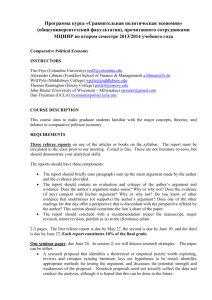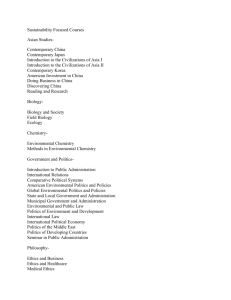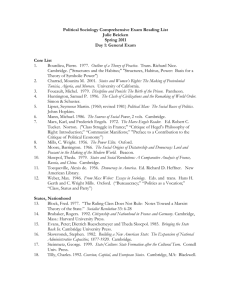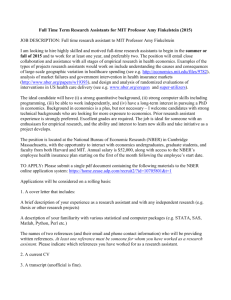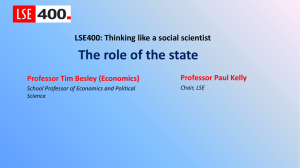General - Columbia University
advertisement
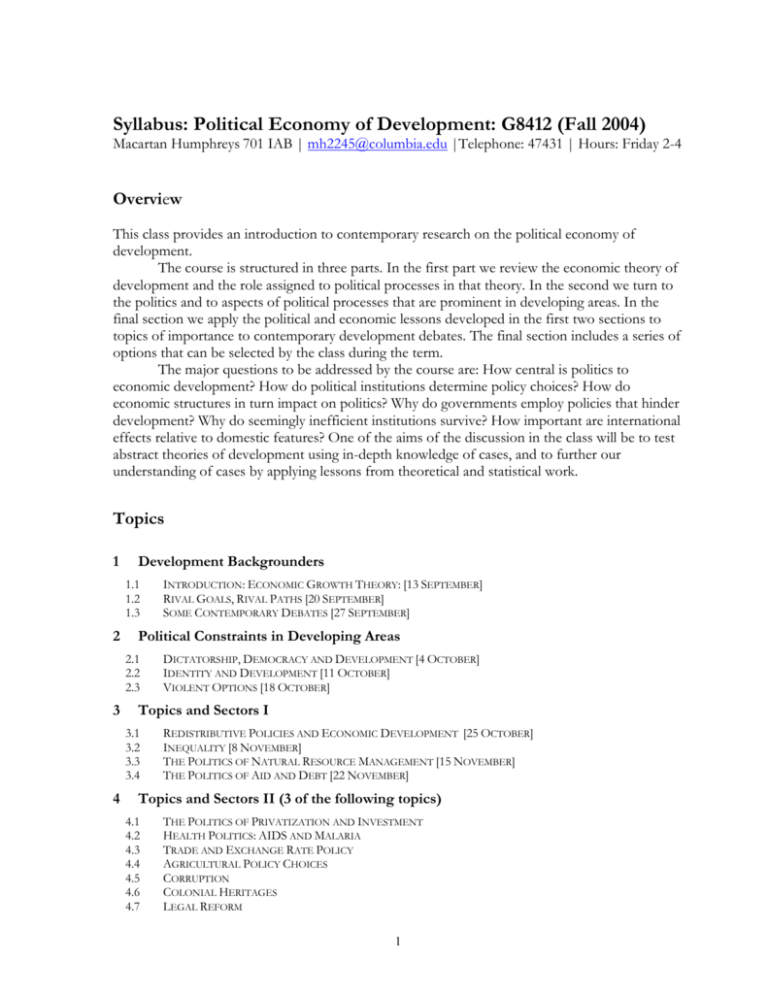
Syllabus: Political Economy of Development: G8412 (Fall 2004) Macartan Humphreys 701 IAB | mh2245@columbia.edu |Telephone: 47431 | Hours: Friday 2-4 Overview This class provides an introduction to contemporary research on the political economy of development. The course is structured in three parts. In the first part we review the economic theory of development and the role assigned to political processes in that theory. In the second we turn to the politics and to aspects of political processes that are prominent in developing areas. In the final section we apply the political and economic lessons developed in the first two sections to topics of importance to contemporary development debates. The final section includes a series of options that can be selected by the class during the term. The major questions to be addressed by the course are: How central is politics to economic development? How do political institutions determine policy choices? How do economic structures in turn impact on politics? Why do governments employ policies that hinder development? Why do seemingly inefficient institutions survive? How important are international effects relative to domestic features? One of the aims of the discussion in the class will be to test abstract theories of development using in-depth knowledge of cases, and to further our understanding of cases by applying lessons from theoretical and statistical work. Topics 1 Development Backgrounders 1.1 1.2 1.3 2 Political Constraints in Developing Areas 2.1 2.2 2.3 3 DICTATORSHIP, DEMOCRACY AND DEVELOPMENT [4 OCTOBER] IDENTITY AND DEVELOPMENT [11 OCTOBER] VIOLENT OPTIONS [18 OCTOBER] Topics and Sectors I 3.1 3.2 3.3 3.4 4 INTRODUCTION: ECONOMIC GROWTH THEORY: [13 SEPTEMBER] RIVAL GOALS, RIVAL PATHS [20 SEPTEMBER] SOME CONTEMPORARY DEBATES [27 SEPTEMBER] REDISTRIBUTIVE POLICIES AND ECONOMIC DEVELOPMENT [25 OCTOBER] INEQUALITY [8 NOVEMBER] THE POLITICS OF NATURAL RESOURCE MANAGEMENT [15 NOVEMBER] THE POLITICS OF AID AND DEBT [22 NOVEMBER] Topics and Sectors II (3 of the following topics) 4.1 4.2 4.3 4.4 4.5 4.6 4.7 THE POLITICS OF PRIVATIZATION AND INVESTMENT HEALTH POLITICS: AIDS AND MALARIA TRADE AND EXCHANGE RATE POLICY AGRICULTURAL POLICY CHOICES CORRUPTION COLONIAL HERITAGES LEGAL REFORM 1 REQUIREMENTS 1. Reading: The Syllabus lists both required reading and further reading. You will be expected to have completed all the required readings before class to the point where you can be called on to critique or defend any reading. The reading loads are not especially heavy but you should aim to read them carefully and reflectively. Before approaching each reading think about what the key questions are for the week and about how the questions from this week relate to what you know from previous weeks. Then skim over the reading to get a sense of the themes it covers, and, before reading further, jot down what questions you hope the reading will be able to answer for you. Next, read the introduction and conclusion. This is normally enough to get a sense of the big picture. Ask yourself: Are the claims in the text surprising? Do you believe them? Can you think of examples of places that do not seem consistent with the logic of the argument? Is the reading answering the questions you hoped it would answer? If not, is it answering more or less interesting questions than you had thought of? Next ask yourself: What types of evidence or arguments would you need to see in order to be convinced of the results? Now read through the whole text, checking as you go through how the arguments used support the claims of the author. It is rare to find a piece of writing that you agree with entirely. So, as you come across issues that you are not convinced by, write them down and bring them along to class for discussion. Also note when you are pleasantly surprised, when the author produced a convincing argument that you had not thought of. Most of the readings are available on-line. In most places this is indicated. For the few that are not, all readings are available in the libraries. 2. Arguing (20%). You will be expected to participate in seminars each week. You should come prepared to argue and defend assigned and unassigned positions. 3. Develop Country Expertise: We expect that you will become our class expert for one country. Insofar as possible you should choose a country that you are not already familiar with and that exhibits features unlike countries that you are already an expert of. For each of the topics that we will look at you should read up especially on the situation for your country for that topic. In developing this expertise you will be able to get more out of the readings, and you will also be a resource for the rest of the class who will then be able to call on you for your evaluation of the situation in your country. 4. Referee Reports (310%). You will be expected to write referee reports on three of the readings on the syllabus, from three separate weeks of your choosing—with one from each of parts 2, 3 and 4 of the syllabus. These are typically around 3 pages long, they should summarize in a paragraph the core contention of the paper and then critique key aspects of the results, indicating whether the paper should or should not be published and what revisions are required to improve it. The best response papers, going beyond the call of duty, replicate results and submit them to robustness tests. These reports can easily form the basis of your seminar paper. 5. Written Assignments (50%). You will be expected to write a single 20-30 page research paper displaying original research and probing in depth one of the themes of the course and due on 10 December 2004. These research papers will contain (i) a theoretical argument, engaging with one of the key themes of the course, (ii) an empirical test of that argument and (iii) a discussion of policy prescriptions resulting from the argument. The empirical part does not have to be quantitative but it does have to constitute a genuine test of your argument. 2 SYLLABUS 1 1.1 Development Backgrounders Introduction: Economic Growth Theory: [13 September] (1) Barro, Robert. 1997. Determinants of Economic Growth. Cambridge, Mass.: MIT Press. Chapters 1-2. (2) Torsten Persson and Guido Tabellini. 2000. Political Economics - Explaining Economic Policy. MIT Press. Chapter 14. (3) Temple, Jonathan. 1999. “The New Growth Evidence.” Journal of Economic Literature. 37(1), March, 112-156. * I also recommend three backgrounders to ease you into the questions of the course. * Chinua Achebe. 1989. Anthills of the Savannah. New York: Anchor. * Kiltgaard, Robert. 1991. Tropical Gangsters: One Man's Experience With Development and Decadence in Deepest Africa.. New York: Basic Books. * Robert Bates. 1990. "Macropolitical Economy in the Field of Development" in Perspectives on Positive Political Economy, edited by James E. Alt and Kenneth A. Shepsle, New York: Cambridge University Press, 1990. Douglass North. 1990. Institutions, Institutional Change and Economic Performance. Cambridge: Cambridge University Press. Alberto Alesina and Roberto Perotti. 1994. “The Political Economics of Growth: A Selective Survey and Some New Results.” World Bank Economic Review, September 1994, pages 351-371. 1.2 Rival Goals, Rival Paths [20 September] (1) Amartya Sen. 1999. Development as Freedom, New York: Anchor Books. Chapters 1 and 2. (1) UNDP. “Calculating the Human Development Indices.” Technical Notes to the 2004 HDR. http://hdr.undp.org/docs/statistics/indices/technote_1.pdf (2) Lant Pritchett. 1997. “Divergence, Big Time.” Journal of Economic Perspectives, (Summer) http://ideas.repec.org/a/aea/jecper/v11y1997i3p3-17.html (3) Deepak Lal. 1996. “From Planning to Regulation: Toward a New Dirigisme?” The Cato Journal17(2) http://www.cato.org/pubs/journal/cj17n2-6.html 3 (3) Krugman, Paul. “The Myth of Asia's Miracle.” Foreign Affairs 73, (Nov/Dec 1994): 62-78. http://web.mit.edu/krugman/www/myth.html (3) Stiglitz, Joseph. 1997. “The Role of Governments in the Economies of Developing Countries” in Edmond Malinvaud et al, 1997. Development Strategy and the Management of the Market Economy, Volume 1. Oxford: Clarendon Press. (1) Basu, Kaushik. “On the Goals of Development” in Meier, Gerald and Joseph Stiglitz. 2001. Frontiers of Development Economics. Washington: The World Bank.. (2) Daniel Quah. 1996 “Twin Peaks: Growth and Convergence in Models of Distribution Dynamics” The Economic Journal. 106. http://ideas.repec.org/a/ecj/econjl/v106y1996i437p1045-55.html (2) Xavier Sala-i-Martin. “The World Distribution of Income.” www.nber.org/papers/w8933.pdf http://www.columbia.edu/~xs23/papers/WorldDistribution.htm (3) Albert Hirschman. 1968. “Political Economy of Import Substituting Industrialization in Latin America.” Quarterly Journal of Economics 82:1 (February) 1-32 http://links.jstor.org/sici?sici=00335533%28196802%2982%3A1%3C1%3ATPEOII%3E2.0.CO%3B2-1 (3) Deepak Lal. 1985. “The Misconceptions of ‘Development Economics.” Finance and Development (June):10-13. (3) Williamson, John. 2000. “What Should the World Bank Think about the Washington Consensus?” The World Bank Research Observer 15, 2 (Aug): 251-64. www.worldbank.org/research/journals/wbro/obsaug00/pdf/(6)Williamson.pdf (3) Shahid, Yusuf, et. al. "Innovative East Asia: The Future of Growth." Chap. 4 in The Transition to Innovative Economies in East Asia Washington: World Bank, 2003. (3) Stephan Haggard, Pathways from the Periphery, Chapters 1-2 (3) Gary Gerefi, “Rethinking Development Theory: Insights from East Asia and Latin America.” in Comparative National Development edited by A Douglas Kincaid and Alejandro Portes, pp. 26-56, 1.3 Some Contemporary Debates [27 September] (1) Engerman, Stanley and Kenneth Sokoloff, "Factor Endowments, Institutions and Differential Paths of Growth Among New World Economies: A View from Economic Historians of the United States.” NBER Working Paper Series, (Historical Paper No. 66): 1-45. http://www.nber.org/papers/h0066 (2) Frankel, J., Romer, D., 1999. Does trade cause growth?, American Economic Review 89, 37999. (3) Acemoglu, Daron, Simon Johnson and James Robinson. 2001. "The Colonial Origins of Comparative Development: An Empirical Investigation.." American Economic Review, vol. 91 (5) 1369-1401 4 (4) Rodrik, Dani, Arvind Subramanian, and Francesco Trebbi “Institutions Rule: The Primacy of Institutions over Geography and Integration in Economic Development” NBER WP 9305, October 2002. http://ideas.repec.org/p/nbr/nberwo/9305.html (4) Sachs, Jeffrey. 2003, “Institutions Don’t Rule: Direct Effects of Geography on Per Capita Income.” NBER Working Paper 9490 (Cambridge, Massachusetts: National Bureau of Economic Research). http://www.nber.org/papers/9490 (2) Easterly, William, and Ross Levine, 2002, “Tropics, Germs and Crops: How Endowments Influence Economic Development.” NBER Working Paper 9106 (Cambridge, Massachusetts: National Bureau of Economic Research). http://www.nber.org/papers/W9106 Démurger, Sylvie, and others, 2002, “Geography, Economic Policy, and Regional Development in China.” Asian Economic Papers, Vol. 1 (Winter), pp. 146–97. 2 2.1 Political Constraints in Developing Areas Dictatorship, Democracy and Development [4 October] (1) Acemoglu, Daron and James Robinson (2002), "Chapter 1: Introduction" in Acemoglu and Robinson. Political Origins of Dictatorship and Democracy, forthcoming. http://www.mit.edu/afs/athena/course/14/14.773/www/Chapter 11.pdf (1) Myerson, Roger. 1993. “Incentives to Cultivate Favored Minorities under Alternative Electoral Systems.” American Political Science Review, 87. (2) Przeworski, A. and F. Limongi (1997). “Modernization: Theories and Facts.” World Politics 49(2). (3) North, Douglas C. and Barry R. Weingast. 1989. "Constitutions and Commitment: The Evolution of Institutional Governing Public Choice in Seventeenth-Century England" Journal of Economic History, 49, 803 – 832 http://links.jstor.org/sici?sici=00220507%28198912%2949%3A4%3C803%3ACACTEO %3E2.0.CO%3B2-9 Haggard, Stephen and Robert R. Kaufman (1992), "Economic Adjustment and the Prospects for Democracy" in Haggard, Stephen and Robert R. Kaufman. The Politics of Economic Adjustment, Princeton: Princeton University Press. Timothy Besley and Stephen Coate, 1997, “An economic model of representative democracy.” Quarterly Journal of Economics 112: 85-114. Benjamin Jones and Benjamin Olken. 2004. “Do Leaders Matter?” Harvard University, Working Paper. http://www.people.fas.harvard.edu/~bolken/leaders.pdf 5 Torsten Persson and Guido Tabellini. 2000. Political Economics: Explaining Economic Policy. MIT Press. Chapters 3, 8 and 9. Przeworski, Adam, and Fernando Limongi. "Political Regimes and Economic Growth." Journal of Economic Perspectives 7 (Summer 1993): 51-69. http://links.jstor.org/sici?sici=08953309%28199322%297%3A3%3C51%3APRA EG%3E2.0.CO%3B2-L 2.2 Identity and Development [11 October] (1) Alesina, Alberto, Reza Baqir and William Easterly (1999). "Public Goods and Ethnic Divisions." Quarterly Journal of Economics, vol. 114(4), p. 1243-1284. http://www.worldbank.org/html/dec/Publications/Workpapers/wps2000series/wps210 8/wps2108.pdf (2) W. Easterly and R. Levine, ‘Africa's Growth Tragedy: Policies and Ethnic Divisions’; Quarterly Journal of Economics, 112, 4 (1997), 1203-50. (3) Robert H. Bates, "Ethnicity in Contemporary Africa" Program in Eastern African Studies, Working Paper XIV, Maxwell School, Syracuse University, 1973. (3) Dan Posner, 2003. “The Political Salience of Cultural Difference: Why Chewas and Tumbukas are Allies in Zambia and Adversaries in Malawi.” UCLA: Working Paper. http://www.globalization-africa.org/papers_detail.php?Paper_ID=20 (4) Raghabendra Chattopadhyay and Esther Duflo 2001 “Women as Policy Makers: Evidence from a India-Wide Randomized Policy Experiment.” http://econwww.mit.edu/faculty/eduflo/files/papers/chick3comp.pdf Rohini Pandi. 2002. “Can Mandated Political Representation Increase Policy Influence for Disadvantaged Minorities? Theory and Evidence from India” Working Paper. Yale University http://www.econ.yale.edu/~rp269/website/aerfin.pdf 2.3 Violent Options [18 October] (1) Bates, Robert H., Avner Greif and Smita Singh. "Organizing Violence." Journal of Conflict Resolution 46(5), October 2002, 599-628. http://www.ingenta.com/isis/browsing/AllIssues?journal=infobike://sage/j222&display Login=true&source=EasyLink&redirectTo=/browsing/AllIssues%3fjournal=infobike:/ /sage/j222 6 (2) Collier, Paul. 1999a. “On the Economic Consequences of Civil War.” Oxford Economic Papers. 51, pp. 168-83. (2) Edward Miguel, Shanker Satyanath, Ernest Sergenti. 2003. "Economic Shocks and Civil Conflict: An Instrumental Variables Approach" http://www.stanford.edu/group/SITE/Miguel.pdf (3) Volkov, V. 1999. “Violent entrepreneurship in post-communist Russia.” Europe-Asia Studies 51: 741-754. www.stanford.edu/group/Russia20/volumepdf/Volkov.pdf James Fearon and David Laitin. 2003. “Ethnicity, Insurgency and Civil Wars” American Political Science Review. Nicholas Sambanis, 2004 Poverty and the Organization of Political Violence: A Review and Some Conjectures http://www.brook.edu/es/commentary/journals/tradeforum/papers/200405_sa mbanis.pdf Jean-Paul Azam. 2000. “Looting and Conflict Between Ethno-Regional Groups.” Working Paper. ARQADE/World Bank. Gambetta Diego. 1993. The Sicilian Mafia: The business of private protection. Harvard University Press, Cambridge. Collier, Paul and Anke Hoeffler. 2000b. “Aid, Policy and Peace.” Working Paper. World Bank. 3 3.1 Topics and Sectors I Redistributive Policies and Economic Development [25 October] (1) Avinash Dixit and John Londregan, “Redistributive Politics and Economic Efficiency.” American Political Science Review 89 (December 1995): 856-866. (2) Daron Acemoglu and James Robinson, “Inefficient Redistribution.” American Political Science Review 95 (September 2001): 649-661. http://journals.cambridge.org/bin/bladerunner?REQUNIQ=1094862648&REQSESS= 3252875&117000REQEVENT=&REQINT1=92478&REQAUTH=0 (3) Alberto Alesina and Dani Rodrik. 1994. “Distributive Politics and Economic Growth.” Quarterly Journal of Economics 109: 465-490. (4) Leonard Wantchekon, “Clientelism and Voting Behavior: A Field Experiment in Benin.” http://www.nyu.edu/gsas/dept/politics/faculty/wantchekon/research/client.pdf Bardan, Pranab. “Distributive Conflicts, Collective Action and Institutional Economics” in Meier, Gerald and Joseph Stiglitz. 2001. Frontiers of Development Economics. Washington: The World Bank.. 7 David Austen-Smith. 2000. “Redistributing Income under Proportional Representation.” Journal of Political Economy 108: 1235-1269. Andrei Shleifer and Robert W. Vishny (1998) The Grabbing Hand: Government Pathologies and their Cures, Harvard University Press, Cambridge MA. David P. Baron. 1995. “The economics and politics of regulation: perspectives, agenda and approaches” in Jeffrey S. Banks, Eric Allen Hanushek 1995. Modern Political Economy. Cambridge, Cambridge University Press. Kevin M. Murphy, Andrei Shleifer and Robert W. Vishny. 1993. “Why Is Rent-Seeking So Costly to Growth?” American Economic Review Papers and Proceedings 83 (May): 409-414. University Holiday [1 November] **** Submit Outline of Paper **** 3.2 Inequality [8 November] (1) Benabou, Roland., 1996. “Inequality and Growth.” in NBER Working Paper 5658. http://www.wws.princeton.edu/rbenabou/w5658.pdf (2) Aghion, Philippe, Caroli, Eve and Garcia-Penalosa, Cecilia (1999). Inequality and economic growth: the perspective of the new growth theories. Journal of Economic Literature, 37(4), December, 1615-1660. http://ideas.repec.org/a/aea/jeclit/v37y1999i4p16151660.html (2) Barro, Robert., “Inequality and Growth in a Panel of Countries.” Journal of Economic Growth, 5(2000), 5-32. post.economics.harvard.edu/ faculty/barro/papers/p_inequalitygrw.pdf (3) Easterly, William. “The Political Economy of Growth Without Development: A Case Study of Pakistan” in Dani Rodrik. 2003. In Search of Prosperity: Analytic Narratives on Economic Growth. Princeton: Princeton University Press. (4) Angus Deaton, 2003. "Health, Inequality, and Economic Development" Journal of Economic Literature, March 2003, v. 41, iss. 1, pp 113-158 Forbes, K.J. 2000. “A Reassessment of the Relationship Between Inequality and Growth.” American Economic Review, 90(2000), 869-887. Persson, T. and G. Tabellini, “Is Inequality Harmful for Growth?” American Economic Review, 84(1994), 600-621. Alberto Alesina and Roberto Perotti. 1996. "Income Distribution, Political Instability, and Investment.” European Economic Review. Roberto Perotti. 1996. “Growth, Income Distribution, and Democracy: What the Data Say.” Journal of Economic Growth 1: 149-187. 8 3.3 The Politics of Natural Resource Management [15 November] (1) Ricky Lam and Leonard Wantchekon, 2003. “Political Dutch Disease.” NYU Working Paper: http://www.nyu.edu/gsas/dept/politics/faculty/wantchekon/research/lr-04-10.pdf (2) Xavier Sala-i-Martin and Arvind Subramanian. 2003. “Addressing the Natural Resource Curse: An Illustration from Nigeria” June 2003 . Arvind Subramanian, NBER Working Paper No. w9804 http://papers.nber.org/papers/W9804 (3) Michael Ross. 2003. “What do we know about natural resources and civil wars?” Journal of Peace Research. www.polisci.ucla.edu/faculty/ross/whatdoweknow.pdf (4) The Open Society Institute. 2003. Caspian Oil Windfalls: Who Will Benefit? Open Society Institute. New York. 3.4 The Politics of Aid and Debt [22 November] (1) Jean Paul Azam and Jean-Jacques Laffont. 2001. “Contracting for Aid” ARQADE Working Paper. (2) Mosley, Paul (1988) “On Persuading a Leopard to Change His Spots: Optimal Strategies for Donors and Recipients of Conditional Development Aid” In Toward a Political Economy of Development: A Rational Choice Perspective, edited by Robert H. Bates, pp. 47-79. Berkeley, Los Angeles: University of California Press. (3) James Vreeland and Adam Przeworski.”The Effect of IMF Programs on Economic Growth “The Journal of Development Economics Vol. 62”, No. 2, pp. 385-421, 2000. (3) Bill Easterly. 2003. “Can Foreign Aid Buy Growth” Journal of Economic Perspectives, 17 (3): 23-48. http://www.nyu.edu/fas/institute/dri/Easterly/File/EasterlyJEP03.pdf (3) Michael Clemens, Steven Radelet, Rikhil Bhavnani. 2004. “Counting chickens when they hatch: The short-term effect of aid on growth” CGD Working Paper 44 http://www.cgdev.org/Publications/?PubID=130 Carles Boix. 2001. “Democracy, Development and the Public Sector.” American Journal of Political Science 45. Rodrik, Dani. 1998. “Why Do Open Economies Have Bigger Governments?” Journal of Political Economy 106: 997-1032. Barbara Stallings, "International Influence on Economic Policy: Debt, Stabilization, and Structural Reform.” pp. 41-88 Block, S. 1999. “Political Business Cycles, Democratization, and Economic Performance: The Case of Africa.” Working Paper. Tufts University. 9 4 4.1 Topics and Sectors II (3 of the following topics) The Politics of Privatization and Investment (1) Fernandez, Raquel and Dani Rodrik. 1991. “Resistance to Reform 1991 American Economic Review 91 5 (2) Roemer, John. 1994. A Future for Socialism? Cambridge: Harvard University Press. (3) Pablo T. Spiller 1995. “Regulatory commitment and utilities’ privatization: implications for future comparative research.” in Jeffrey S. Banks, Eric Allen Hanushek 1995. Modern Political Economy. Cambridge, Cambridge University Press. (4) John Waterbury. The Heart of the Matter? Public Enterprise and the Adjustment Process” in Haggard, Stephen and Robert R. Kaufman. The Politics of Economic Adjustment, Princeton: Princeton University Press. Bernardo Bortolotti and Paolo Pinotti. 2003. The Political Economy of Privatization FEEM Working Paper. http://www.feem.it/NR/rdonlyres/8EE08695-A06646E2-835F-F0498D3BFA54/732/4503.pdf Barzel, Yoram. 1990. Economic Analysis of Property Rights. Cambridge: Cambridge University Press. Oliver C. Campbell White and Anita Bhatia. 1998. Privatization in Africa. Directions in Development series, World Bank, Washington, D.C. Coase, Ronald. 1960. "The Problem of Social Cost." Journal of Law and Economics 4.2 Health Politics: AIDS and Malaria (1) Hazem Adam Ghobarah, Paul Huth, Bruce Russett.2 004. “Comparative Public Health: The Political Economy of Human Misery and Well-Being.” International Studies Quarterly. 48: 1 (2) Alex de Waal. 2003. “How will HIV/ AIDS transform African Governance?” in: Africa Affairs 102: 1-23. (3) Jones, Jennifer. 2004. "The End is Nigh: The Varied Responses of African States to AIDS" Paper presented at the annual meeting of American Political Science Association Hilton Chicago and the Palmer House Hilton, Chicago, IL. archive.allacademic.com/publication/getfile.php?file=docs/apsa_proceeding/2004-0831/28655/apsa_proceeding_28655.PDF&PHPSESSID=6d3655a746c0e0d59ae7fc8ec3d0 9a3e (4) Samantha Power. 2003. “The AIDS Rebel.” in: The New Yorker, 19 May 2003. Mark Schoofs. 1999. Aids: The Agony of Africa. www.villagevoice.com/specials/africa 10 4.3 Trade and Exchange Rate Policy (1) Gene Grossman and Elhanan Helpman. 1994. “Protection for Sale.” American Economic Review 84: 833-850. (2) Robert H. Bates. 1984. Markets and States in Tropical Africa. University of California Press. (3) David Leblang. 2000. “To Devalue or Not to Devalue? The Political Economy of Exchange Rate Policy.” http://www.courses.fas.harvard.edu/~gov2160/syllabus/Leblang.pdf (4) Sahn, David, Paul Dorosh and Stephen Younger Structural Adjustment Reconsidered (Cambridge: Cambridge University Press 1997), Chapter 3. Alícia Adserà and Carles Boix. “The Political Economy of Trade and Economic Integration: A Review Essay.” Working Paper. University of Chicago. Kishore Gawande and Usree Bandyopadhyay, “Is Protection for Sale? Evidence on the Grossman-Helpman Theory of Endogenous Protection.” Review of Economics and Statistics 82 (2000): 139-152. Alt, James, Jeffry Frieden, Michael Gilligan, Dani Rodrik and Ronald Rogowski. 1996. "The Political Economy of International Trade: Enduring Puzzles and an Agenda for Inquiry.” Comparative Political Studies, 29: 689-717. Fernandez, Raquel and Dani Rodrik. 1991. “Resistance to Reform: Status Quo Bias in the Presence of Individual-Specific Uncertainty.” AER 81 No. 5. 4.4 Agricultural Policy Choices (1) Eswaran, M. and A. Kotwal. 1986. “Access to Capital and Agrarian Production Organization.” Economic Journal, 96, 482-98. (2) Philip T. Hoffman. 1988. “Institutions and Agriculture in Old Regime France.” Politics and Society 16, 2-3:246-64. (3) Robert H. Bates. “Some Conventional Orthodoxies in the Study of Agrarian Change.” California Institute of Technology, Social Science Working Paper 458, December 1983. (4) Ashutosh Varshney, “Ideas, Interest and Institutions in Policy Change: Transformation of India’s Agricultural Strategy in the mid-1990s.” Policy Sciences (22): 289-323 J. A. Yelling, Common Field and Enclosure in England, 1450-1850 (London: Archon, 1977). C. Peter Timmer, “The Turnip, the New Husbandry, and the English Agricultural Revolution.” Quarterly Journal of Economics 83 (1969):375-396. 11 4.5 Corruption (1) Alberto Ades; Rafael Di Tella The American Economic Review, Vol. 89, No. 4. (Sep., 1999), pp. 982-993. http://links.jstor.org/sici?sici=00028282%28199909%2989%3A4%3C982%3ARCAC%3E2.0.CO%3B2-W (1) Daniel Triesman. 2000. “The Causes of Corruption: A Cross-National Study.” Journal of Public Economics. 76 (3). www.sscnet.ucla.edu/polisci/faculty/treisman/pages/causes.PDF (2) Li, H., L.C. Xu and H-F. Zou. “Corruption, Income Distribution, and Growth.” Economics and Politics. 12(2000), 155-182. (3) Ray Fisman. 2001. Estimating the Value of Political Connections. American Economic Review. http://www-1.gsb.columbia.edu/faculty/rfisman/estimating_the_value.pdf 4.6 Colonial Heritages (1) Englebert, Pierre. “Pre-colonial institutions, post-colonial states, and economic development in tropical Africa” Political Research Quarterly; Mar 2000; 53, 1; Research Library (2) Daron Acemoglu, Simon Johnson, James A. Robinson. “Reversal Of Fortune: Geography And Institutions in The Making Of The Modern World Income Distribution.” The Quarterly Journal of Economics 117 (4) 1231 -- 1294 http://ideas.repec.org/a/tpr/qjecon/v117y2002i4p1231-1294.html (3) Bannerjee, Abhijit and Lakshmi Iyer. 2002. "History, Institutions and Economic Performance: The Legacy of Colonial Land Tenure Systems in India." Working Paper. (4) Lakshmi Iyer. 2002. "The Long-term Impact of Colonial Rule: Evidence from India"', Working Paper, MIT. http://web.mit.edu/14.772/www/Iyer_colonial.pdf 4.7 Legal Reform (1) La Porta, Rafael, Florencio Lopez-de-Silanes, Andrei Shleifer, and Robert W. Vishny. “Law and Finance.” Journal of Political Economy, 106, 6 (December 1998): 1113-1155. (1) Daniel Berkowitz, Karina Pistor, Jean-Francois Richard 2001. “Economic Development, Legality, and the Transplant Effect” William Davidson Institute Working Papers Series http://ideas.repec.org/p/wdi/papers/2001-410.html (2) Alford, William.2000. “The More Law, the More . . .? Measuring Legal Reform in the People's Republic of China.” Center for Research on Economic Development and Policy Reform: WP: 59, Stanford. (August) http://credpr.stanford.edu/publications/abstracts.html#58 (2) Ann Seidman and Robert B. Seidman. “Drafting Legislation for Development: Lessons from a Chinese Project” 44 A.J.Comp. L. 101 (1996) 12

